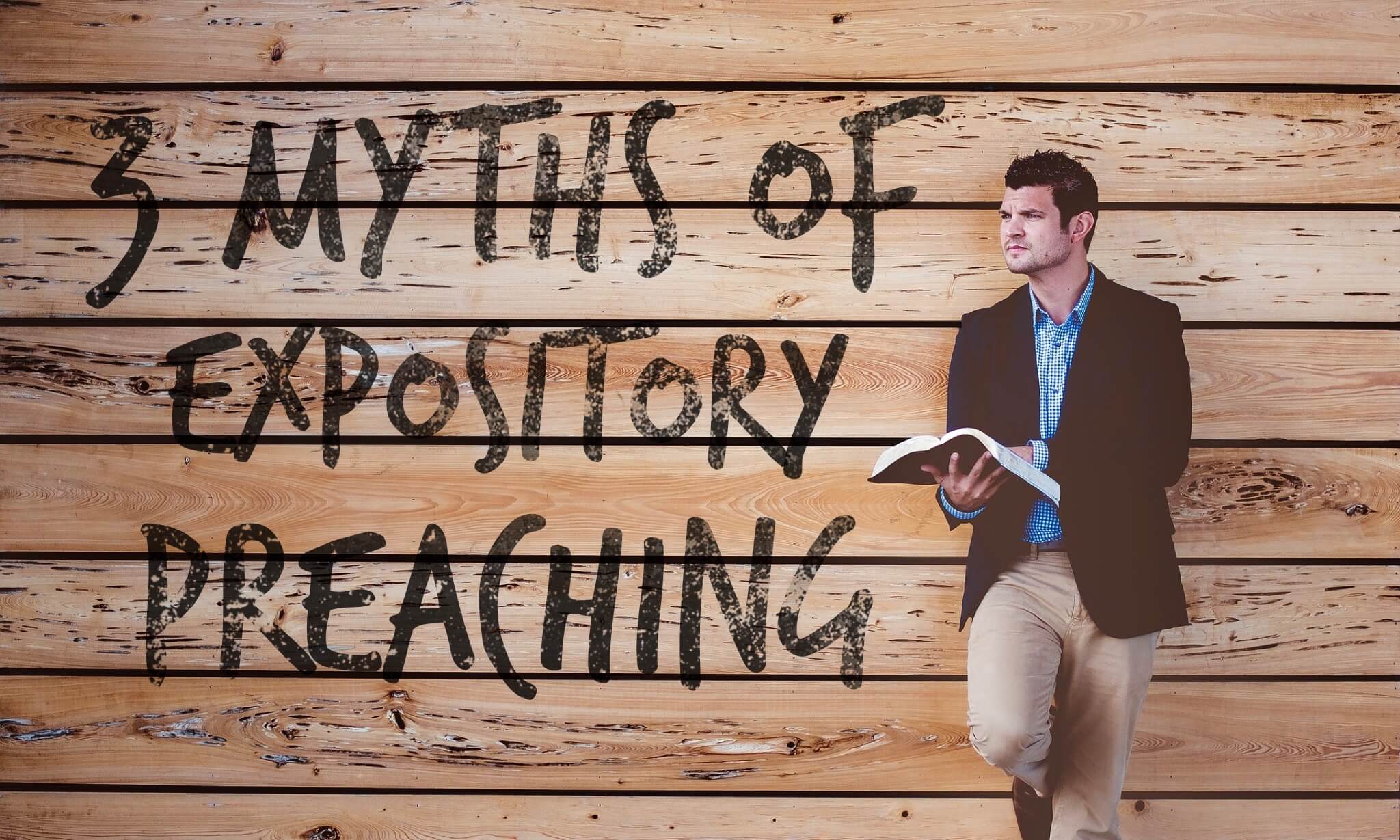3 Myths of Expository Preaching

What is expository preaching?
If you ask around you’ll get a variety of answers and definitions.
But I believe there’s a lot of misinformation.
So to explain what expository preaching is, we need to understand what expository preaching is not.
There are three myths that we need to dispel:
1. Expository preaching is NOT preaching verse-by-verse through books of the Bible.
You can preach expository sermons this way. There is nothing wrong with this approach. But there is a large group of pastors who champion this method as the only way for faithful expository preaching.
That is false. Expository sermons can also be topical.
It has nothing to do with the length of a passage or the number of sermons in a series of messages. You could preach a masterful, expository sermon on a single verse.
2. Expository preaching is NOT preaching a commentary.
It is not a presentation of your exegetical method. Exegesis is what we do to study a text, but a sermon is much more than breaking down the root of every Hebrew/Greek word. It could include this, but it doesn’t have to.
You may find it helpful. But if you share all of your word studies, you will clutter the sermon and confuse your audience.
Commentaries are helpful for study, but expository preaching is more than sharing your study notes.
3. Expository preaching is NOT boring.
“Expository” sounds like a boring, ten-dollar-word you learn in seminary. But expository preaching should be fascinating.
The Bible is not boring; some pastors are. Don’t confuse the two.
Good expository preaching should excite and inspire people as they see how the truth of God’s Word can radically transform their lives.
What Is Expository Preaching?
Expository preaching is preaching with a high view of Scripture.
Expository preachers take the Bible seriously and know that nothing they come up with on their own will have any power to change.
They believe that “All Scripture is breathed out by God and profitable for teaching, for reproof, for correction, and for training in righteousness” (2 Timothy 3:16).
They believe God’s promise to Isaiah still applies to us today:
“For as the rain and the snow come down from heaven and do not return there but water the earth, making it bring forth and sprout, giving seed to the sower and bread to the eater, so shall my word be that goes out from my mouth; it shall not return to me empty, but it shall accomplish that which I purpose, and shall succeed in the thing for which I sent it” (Isaiah 55:10-11).
The inspired Word of God is the power of the sermon.
Therefore, I believe an expository preacher does four things:
- Studies the text. They begin by asking questions and seeking to understand the meaning of the text in the way God intends it to be understood. Instead of asking, “What will I say?” They begin with, “What does God say?”
- Argues the text. A sermon is a persuasive speech. There are skeptics in every audience who need convincing. Your goal should be to convince everyone how “Every word of God proves true” (Proverbs 30:5).
- Applies the text. The Bible is meant to do more than inform believers. So the expository preacher connects how the truth of the text applies to their audience and should change how they think and live. They inspire people to “be doers of the word, and not hearers only” (James 1:22).
- Stays in the text. This is critical: The main point of the text is the main point of the sermon. Expository preaching does not wander outside the boundaries of the Bible’s intended meaning. It keeps the text in context and does not speak authoritatively about what the Bible does not say.
It’s hard to define expository preaching simply. There are many ways to do it well and many more pitfalls.
Haddon Robinson said it best:
”Expository preaching at its core is more a philosophy than a method. Whether or not we can be called expositors starts with our purpose and with our honest answer to the question: “Do you, as a preacher, endeavor to bend your thought to the Scriptures, or do you use the Scriptures to support your thought?” (Biblical Preaching, 22)





I was so blessed to your explanation about expository preaching, am a street preacher and i need more guidance about preaching and teaching.Thamk you, your blessed
My name is Selius Joseph I was so much looking the teacher who teaching about teacher and preacher.
I ask help from you to get your teachings because is so good and it will help me to grow.
I’m a preacher, worship leader and leader for some year’s.
Last but no least I ask you to be my spiritual friend or brother.
Welcome in my country Tanzania.
I too used to think that expository preaching was boring. It was because I had only seen people who were trying to impress with their knowledge of Greek and Hebrew. After doing Langham seminar on expository preaching, I agree with you fully
This is a great explanation of expositional preaching, from the preparation to preaching. I have taught homiletics in the past and I have found that most pastors do not truly understand the meaning of expository preaching, sadly.
Thanks for a concise and focused explanation of expository preaching. I needed this grounding. You “put the hey down where the coat can get it”!
Thank you very much for this poignant explanation of something very often misunderstood. I learned this process from a terrific radio preacher and it made all the difference in my preaching.
On target and understandable
Wonderful message!
Very educative analysts and exposure into Gods word.
this is very helpful to me thanks
I